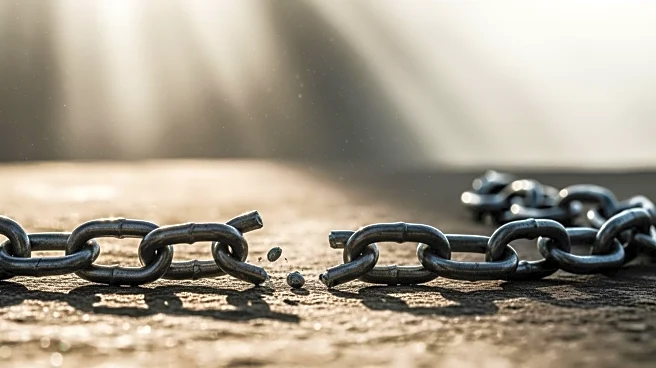What's Happening?
Hamas has declared its commitment to a Gaza deal, while also stating that the bodies of hostages remain trapped under rubble. This development comes as Israel grapples with the aftermath of recent conflicts,
including the slow process of retrieving bodies and the ongoing control exerted by Hamas. The situation has prompted calls for a state commission of inquiry to provide closure for the victims of the October 7 attack. The complexities of the situation are further highlighted by the involvement of international organizations like the Red Cross, which is reportedly on its way to southern Gaza to assist in the retrieval of a deceased hostage's body.
Why It's Important?
The commitment by Hamas to the Gaza deal is significant as it could pave the way for a more stable ceasefire and potentially open avenues for humanitarian aid to reach affected areas. The retrieval of hostages' bodies is a sensitive issue that impacts the families involved and the broader Israeli society, which is still reeling from the recent violence. The call for a state commission of inquiry underscores the need for accountability and transparency in addressing the events leading up to and following the attack. This situation has implications for regional stability and could influence international diplomatic efforts aimed at resolving the conflict.
What's Next?
The next steps involve the continued efforts by international organizations to assist in the recovery of hostages' bodies and the potential establishment of a state commission of inquiry. The reactions from political leaders and civil society groups will be crucial in shaping the future discourse around the conflict. Additionally, the durability of the ceasefire and the ability to address underlying issues such as occupation and siege will be critical in determining the long-term peace prospects in the region.
Beyond the Headlines
The situation highlights the ethical and humanitarian challenges faced in conflict zones, particularly regarding the treatment of hostages and the provision of aid. The political divisions within Israel, as noted by the support for the Hostages' Families Forum, reflect broader societal tensions that could influence future policy decisions. The potential for real change, as mentioned by Lishay Miran-Lavi, suggests a critical juncture for Israeli society in addressing its internal and external challenges.










